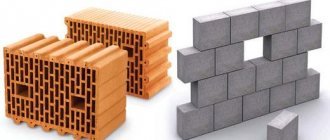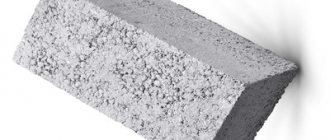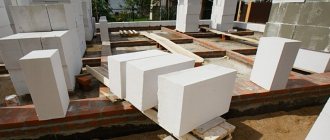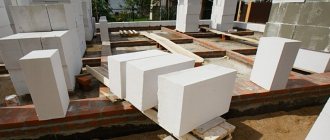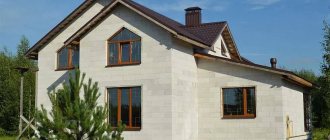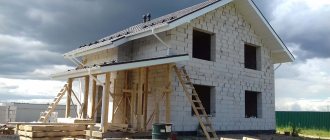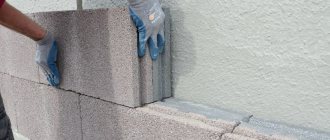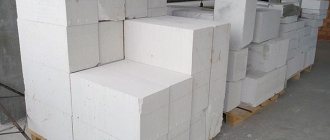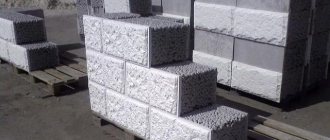Expanded clay blocks are used in the construction of private houses and outbuildings. Building materials are lightweight, durable, low cost, retain heat well, are quickly installed, environmentally friendly, and repairable. When selecting blocks, the shape of the product, quality, shade, texture, and absence of chips are taken into account.
Advantages of houses made of expanded clay concrete blocks
The products are made from sand, water, cement, expanded clay. The ingredients are mixed, the composition is poured into prepared forms and dried.
The outside of the product can be lined with artificial stone; the materials may differ in shades and textures. The product requires a barrier layer of fine-grained expanded clay. The number of layers in products may vary depending on the type of building material.
Expanded clay concrete blocks have pros and cons.
The list of advantages:
- Low thermal conductivity, because the blocks are made of porous material that ensures reliable heat retention.
- The small mass of the blocks is ensured by the lightness of expanded clay granules. The load on the foundation of hollow products is most reduced. The number and size of voids depend on the brand of products, the manufacturer’s technology and can reach up to half of the total volume of the blocks.
- The strength and durability of the building material allows it to withstand overloads of load-bearing structures and floors. In the finished structure, the blocks can withstand increased loads.
- The low cost of the blocks allows you to reduce the costs of the construction project.
- The building material is not subject to shrinkage, so the risk of cracks and chips is reduced.
- The material is made from environmentally friendly ingredients and does not emit toxic fumes.
- The porous material has sound-proofing properties and prevents extraneous sounds from entering the room.
- Walls made of expanded clay blocks are easy to plaster, because... a solution of sand and cement is easily fixed to the surface.
- The materials are simply laid out.
Expanded clay concrete as an inexpensive building material and its advantages
Expanded clay concrete is a concrete structure, lightweight with expanded clay filler, which in turn is naturally plasticized clay foamed during firing. The production technology is quite simple and has been known for a very long time. This is an inexpensive, heat-intensive and environmentally friendly material that significantly exceeds the properties of ordinary clay. The walls are characterized by good wear resistance and strength.
Thus, the use of expanded clay as a filler in the construction of individual houses allows not only to lighten the structure, but also to significantly improve its characteristics. The erected walls turn out to be light, durable and warm; additional insulation with polystyrene foam on both sides makes it possible to simplify the finishing and carry out additional insulation with the “dew point” moving beyond the boundaries of the house wall. This design will be practically “eternal” and, most importantly, inexpensive.
Advantages of expanded clay concrete produced according to GOST:
- surpasses other “light” concretes in heat and sound insulation by approximately 1.5 times;
- has good frost resistance;
- chemically and moisture resistant;
- has a lower price;
- the mass of blocks or composition based on expanded clay concrete is 1.5 times less (the specific gravity of the block is 2.5 times less than that of brick);
- the speed of wall construction is 4–5 times higher than with conventional building materials;
- a lightweight strip foundation is required;
- ensures a reduction in heat loss during operation by 75%;
- can be used in cold and warm climate zones;
- does not require maintenance and is durable;
- unlikely shrinkage due to the low weight of the structure;
- Expanded clay concrete does not burn.
Advice: if you want to build an inexpensive box for an individual home over the summer at minimal cost, take a closer look at expanded clay concrete.
Minuses
The building material has the following disadvantages:
- Porous building materials absorb excess moisture, which crystallizes at low temperatures and contributes to the destruction of the structure of the blocks. Therefore, experts recommend using additional protection against changes in temperature conditions and climatic precipitation when building houses. You can use facing slabs, bricks, etc.
- The blocks are produced in small sizes; during laying, many joints are formed, which facilitate the penetration of cold air into the building. It will be necessary to additionally insulate the wall panels from the outside, and, if necessary, inside the building.
- The disadvantages of the products are the small sizes of blocks and semi-blocks and a limited selection of product configurations.
- When purchasing, you must check products for defective products.
How to level out the disadvantages
The disadvantages of blocks can be minimized by observing the masonry features and the stage-by-stage technology of building construction.
The list of expert advice includes the following recommendations:
- It is not recommended to leave wall panels without finishing for a long time during construction, because... the structure of the building material will collapse, reducing the strength and durability of the building.
- It is important to carry out high-quality waterproofing of the building, because... Without this work, the walls will become damp and mold may appear.
- It is recommended to make a preliminary calculation of the number of blocks before purchasing, so as not to overpay for additional delivery of materials to the construction site.
- In the northern regions of Russia, it is not recommended to use this building material without high-quality insulation of wall panels.
- For the durability of the structure, it is recommended to install an armored belt on the outside of the wall panels.
- Materials with the addition of expanded clay granules are not suitable for constructing the foundation of a building, because it is impossible to perform high-quality waterproofing in the lower part of the house.
- It is important to perform high-quality installation work for the durability of the structure.
Myths about the danger of blocks
The claim that the units emit harmful fumes is not confirmed. Scientists refute these assumptions, because the material is environmentally friendly and of high quality, does not contain toxic components.
Why expanded clay concrete may be better than other building blocks
- Durability, environmental friendliness, non-flammability of brick. Like brick, expanded clay concrete contains natural calcined clay – these are expanded clay granules. Expanded clay is granules of baked clay. This indicates the environmental friendliness of the material and durability. The granules are already baked, that is, hardened at the highest possible temperature, which means that expanded clay concrete is not flammable. In terms of durability, expanded clay concrete is higher than brick. Basements are even built from it, but this is not recommended due to a number of features of expanded clay.
- Strength and reliability of cinder block. Like cinder block, the bonding material of the block is concrete. Expanded clay concrete block combines all the properties of high-quality concrete - high strength, hardness, wear resistance. But expanded clay concrete does not have the two main disadvantages of cinder block - heavy weight and dubious radiation background of slag.
- Light weight, ease of processing, and high thermal conductivity of foam blocks and gas blocks. Porous expanded clay granules make expanded clay concrete lightweight and thermally conductive.
- Breathing effect of shell rock and heat saving of sippanels. Expanded clay concrete block can be classified as a breathable wall material with minimal heat loss, due to the porosity of expanded clay granules. Expanded clay is not blown away by the wind like shell rock, even without special finishing and does not create the effect of a thermos like foam sippanel.
- Another bonus of an expanded clay concrete block is that, like a cinder block, you can make it with your own hands in artisanal conditions. This fact also speaks about the relative affordability of the material.
Other myths about expanded clay houses
Myths about the disadvantages of expanded clay blocks:
- It can be cold in buildings made of expanded clay blocks - the material retains heat, but requires standard insulation not only of wall panels, but also of the floor, roof, windows and door blocks to maintain a comfortable microclimate in the room. With uninsulated floor coverings, up to 15% of the heat can escape from the room. Up to 25% of heat can escape through an uninsulated roof, windows, and doors.
- The blocks do not hold fastenings - it is recommended to use products with a wall thickness of 3-4 cm. When tested, anchors in wall panels can withstand loads of 400-900 kg.
- Fragility of the material - if construction technologies are followed and high-quality mortar is used, the structure is preserved for a long time and is not inferior in strength to other wall building materials.
Advantages
Houses made of expanded clay concrete have the following advantages :
- High thermal conductivity. It will always be warm inside such a building, but only if the construction technology is followed. According to this indicator, blocks can be compared to wood, so such houses are an ideal option for the harsh Russian climate.
- Light weight. Hollow blocks are lightweight and do not require the installation of a massive foundation.
- High strength. Single elements are fragile and easily break when hit or dropped. However, walls made of them can withstand significant loads, so this material is used for the construction of one- and two-story buildings. Expanded clay concrete is used for the construction of load-bearing walls and partitions.
- Durability. The material is resistant to low temperatures; structural blocks can withstand up to 500 freezing cycles.
Affordable price.
You will be able to save not only on the material itself, but also on its masonry. For comparison, one expanded clay concrete block of standard size 200x200x400 contains more than 8 bricks. Therefore, such a house will cost much less.- Low percentage of shrinkage, which does not exceed 0.3-0.5 mm/m. Thanks to such indicators, houses made of expanded clay concrete do not crack.
- Good sound insulation. Thick walls ensure silence in the room. However, to increase this indicator, you need to install high-quality windows and doors.
- Ease of laying. It’s easy to build a house yourself; you don’t need to have builder skills to do it. It is enough to carefully study the information and perform the calculations correctly.
- Good adhesion of finishing mixtures to the surface of the blocks. All solutions adhere well to them, which facilitates finishing work.
- Availability. Expanded clay concrete blocks are sold everywhere, their production is established in most cities of the country. High competition has a positive effect on prices. However, the savings must be reasonable. You need to buy building materials only from a trusted manufacturer who guarantees the quality of their products.
- Resistant to mold growth. Fungus does not grow in expanded clay concrete blocks, insects and rodents do not live.
- Indifference to chemical exposure.
- Fire resistance. The blocks belong to the class of non-flammable substances, which meets modern fire safety requirements. With a thickness of 150 mm, they do not burn or collapse within 1 hour 30 minutes, and when burned they do not release toxic substances into the environment.
House cost
The building material is budget-friendly and allows you to save money when constructing residential buildings and outbuildings.
Average cost of buildings:
- A two-story house with an area of 80.18 m² made of foam blocks costs from RUB 1,122,520.
- Two-story building with a total area of 82.5 m² - from RUB 1,500,000.
- The cost of building a one-story house with an area of 85.77 m² ranges from RUB 1,201,000.
- A two-story building with an area of 87.7 m² is offered at a price of RUB 1,315,500.
- The cost of constructing a two-story building with an area of 88.9 m² is about 1,600,200 rubles.
- Construction of a two-story house up to 100 m² costs about 1,700,000 rubles.
- A two-story building with a total area of 121.8 m² costs 1,800,000 rubles. The price of an improved version of the complex with an area of 120.11 m² is from RUB 2,161,980.
Scope of materials use
From the above, you can easily determine what work to perform using gas silicate or expanded clay concrete.
For the construction of external and internal walls, it is better to give preference to expanded clay concrete. It is also more suitable for the construction of monolithic structures: screeds and floor slabs.
If we are talking about small structures, then it is more rational to use gas silicate. This material is most often used to build cabins, garages and other household facilities. GS is also used when increasing the number of storeys in buildings, for cladding, heat and sound insulation.
Structures made of gas silicate are erected several times faster than those made of expanded clay concrete.
Comparison with other materials
Expanded clay concrete is compared in terms of performance indicators with standard materials (foam blocks, brick, gas silicate, sawdust concrete, cinder block and ceramic blocks, sand-lime brick) in terms of technical characteristics and composition.
Foam concrete blocks
Foam concrete products, in addition to sand, water, cement powder, contain a foaming agent and fiber fibers. The material is used for the construction of piers, openings, walls in two- and three-story buildings. The weight of the blocks reaches 20-24 kg. The strength of foam blocks is low (about M15); when adding fiber fibers, the parameter increases to M20-25.
The material retains heat well, but is more fragile than expanded clay concrete products. Susceptible to mold formation and may shrink under heavy loads. The building material costs more than products with expanded clay granules.
Gas silicate blocks
Gas silicate products, in addition to standard components, contain foaming agents and lime. Buildings up to 3 floors in height are erected from them. The product has good geometry and is laid out on an adhesive base. Weight varies depending on the density of the products and is about 30 kg.
The strength is not comparable to expanded clay products and remains M35. The material retains heat, but may shrink. The cost of products is higher than expanded clay and is about 3500 per cubic meter.
Sawdust concrete blocks
Sawdust concrete products are created from sand, cement, sawdust and water. The products are used in the construction of internal partitions and outbuildings. The products are distinguished by precise geometry, retain their shape well, and the weight of the blocks is about 18-23 kg.
The strength of the products is low (about M10). Sawdust concrete products are short-lived, absorb moisture, are unstable to sub-zero temperatures, and are not suitable for the construction of load-bearing partitions. The thermal conductivity of sawdust concrete products is similar to expanded clay products. However, the cost of products with wood components is lower than expanded clay.
Cinder blocks
Cinder blocks, in addition to cement, water and sand, contain blast furnace slag and can be used for the construction of internal and external partitions during the construction of buildings of 2-3 floors. Cinder blocks are characterized by imprecise geometry and heavy weight (up to 30 kg per block). The strength of the products is high (up to M50).
It is necessary to take into account the low frost resistance of products, short service life and non-environmental friendliness of the building material. The thermal conductivity of the product is lower than that of products made from expanded clay granules. The cost corresponds to expanded clay concrete products.
Ceramic blocks
Ceramic products differ in low thermal conductivity from products made from expanded clay granules. Ceramics are stronger than expanded clay concrete, can be installed quickly, and are durable (wall panels will last up to 50 years). The building materials are environmentally friendly, have good soundproofing properties, and are light in weight, reducing the load on the foundation.
Sand-lime brick
Sand-lime bricks are strong, durable, and have comparable technical characteristics to products made from expanded clay granules. The strength of silicate products differs depending on the type of product and is produced under the brands M75-M250.
The product is suitable for different types of floors, but is not used in rooms with high humidity, which is similar to products made from expanded clay granules.
Why is it important to know the durability of a material?
Of course, the recommended brand of strength is recommended so that the developer himself determines which expanded clay concrete blocks to use in his construction.
Some people prefer to build even a one-story non-residential building from solid blocks of the highest grade of strength, since it is not the cost of the products that is important to them, but their quality and service life. And someone, without fear, erects a 3-story residential building from material with M35 strength.
In any case, if you use high-grade stones in the construction of any type of walls and buildings, their durability will last for a long time. This is better than saving once and then rebuilding the building or additionally increasing their thickness by laying another row of blocks, since the original blocks with low strength cannot withstand the load.
Types of expanded clay blocks
The ends of the blocks can be grooved, flat, or made using the tongue/groove principle. For use on corners, one edge can be smooth. In addition, the corners can be rounded or straight. On the supporting surfaces (where the mortar is placed), grooves can be formed for laying reinforcement. These grooves should be located at a distance of at least 20 mm from the corner.
An example of tongue-and-groove hollow-core wall expanded clay concrete blocks and their prices
Blocks come with or without voids. The voids can be through or not; they are placed evenly, perpendicular to the working surface. The maximum permissible weight of a building block made of lightweight concrete is 31 kg. The standard standardizes the thickness of the walls that enclose voids:
- outer walls - at least 20 mm;
- partition over blind voids - at least 10 mm;
- between two voids - 20 mm.
Voids are often made flat - in the form of cracks. The number of “lines” with voids determines the thermal conductivity coefficient of the material. The more lines of voids, the warmer (and “quieter”) the wall will be. Air is known to be a poor conductor of heat. At least worse than concrete. Therefore, splitting a block with voids gives a good result.
Grades by density and compressive strength
Based on strength and thermal conductivity, expanded clay concrete blocks are divided into two categories: structural and structural-thermal insulating. Each group may contain products of different densities. Density is the mass of one cubic meter of material in a dry state. The approximate value appears after the letter D. For example, D600 - the mass of a cubic meter is 600 kg, D900 - 900 kg. And so on.
- Structural and thermal insulation:
- D500 B0.75 to B1.75;
- D700 B1.5 to B3.5;
- D800 B2.0 to B3.5;
- D900 B2.5 to B7.5;
- D1000, 1100 B3.5 to B10;
- D1200, 1300, 1400 B5 to B10.
D600 B1.0 to B2.5;
The size of the expanded clay concrete block is determined by standards
- D1100 V 12.5;
In private housing construction, structural and thermal insulation blocks are usually used. For the construction of external walls of one-story houses, expanded clay concrete blocks of grade D700 or D800 are used; for internal unloaded partitions, lower grades can also be used.
